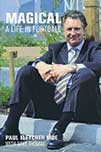 With no communication about an apparent takeover and stadium construction work stalled, Tom Shepherd explains how Northampton fans started to take action
With no communication about an apparent takeover and stadium construction work stalled, Tom Shepherd explains how Northampton fans started to take action
When Northampton Town fans arranged a protest for the club’s home match against Oxford on September 12 – holding up question marks and chanting “We want answers” during the 12th minute of the match – a large proportion of the media coverage centred on the lack of information surrounding the Cobblers’ apparent takeover.
Chairman David Cardoza, who was not at the game to receive the protests, announced in June to some surprise that he had signed an agreement to sell his stake in the club to an Indian consortium – the identity of which was being kept under wraps. Three months later, at the time of the protest, little had been revealed about the selling of the club, the identity of the prospective buyers still no clearer.
But the mystery surrounding the takeover isn’t the only question Cobblers fans feel needs answering. The club’s Sixfields Stadium has been a three-sider for more than a year now, as work on the East Stand redevelopment has stuttered then ultimately ground to a halt. Fans are beginning to wonder what is being done with the £12.25 million the club borrowed from the borough council for the work. As, now, are the council, who – at the time of writing – have given the club just three weeks to pay back the loan in full, claiming the last two repayments have been missed.
“Work on the East Stand has been repeatedly delayed and the takeover negotiations were dragging on and on. People are now asking where the money has gone,” said Labour group leader councillor Danielle Stone. The club have been threatened with legal action should the loan not be repaid, leaving some fans fearing the worst. Cardoza has responded with an assurance the money will be paid back to this deadline.
Plans to redevelop Sixfields were first mooted in July 2012, with a fully worked proposal released just over a year later. The scheme suggested the complete redevelopment of the East Stand, incorporating the club’s offices and a range of hospitality, as well as the renovation of the West Stand. It also included a hotel and small housing project on land adjacent to the ground. The new stadium capacity was expected to reach around 10,000, having previously stood at 7,653. Planning approval was granted in late 2013 – along with the loan from the council to part-fund the development. The target was to have the stadium ready for the 2014-15 season.
Work began in March last year. However, shortly after it had started Cardoza announced that the original plans would need to be scaled back. The new designs were met by a cold response from fans, due to the prominent position of corporate boxes creating seats with restricted views, as well as a reduced capacity of just over 8,000. Fans were starting to question whether the work was extensive enough for the money being spent.
The progress of the East Stand’s redevelopment took a further knock in autumn last year, when work on the site ceased completely – which was put down to a legal dispute. This was later revealed to be the company with whom the club had a contract to complete the stadium works, 1st Land, entering administration. Its top creditor was Buckinghams, the sub-contracters carrying out the work. Six months passed before Buckinghams returned to the site, but work was quickly wound up when talks with the prospective owners surfaced. So the Cobblers have started this year as they played their entire 2014-15 season – in front of a shell of a stand.
For all the problems surrounding the development and takeover, it has been a lack of communication that has irked fans the most. Cardoza had enjoyed a healthy relationship with supporters since becoming chairman in 2002, but many feel that he has been too aloof during such a tumultuous period. Weeks after the initial Oxford protest, Andy Clarke of the supporters’ trust resigned as elected representative on the club’s board, having claimed he found serving as the link between board and trust too difficult to manage.
So far, manager Chris Wilder and his players seem relatively unaffected by the off-pitch drama. However, with the threat of legal proceedings looming, and more protests being planned, whether that focus is maintained remains to be seen.
From WSC 345 November 2015

 With no communication about an apparent takeover and stadium construction work stalled,
With no communication about an apparent takeover and stadium construction work stalled,  A life in football
A life in football